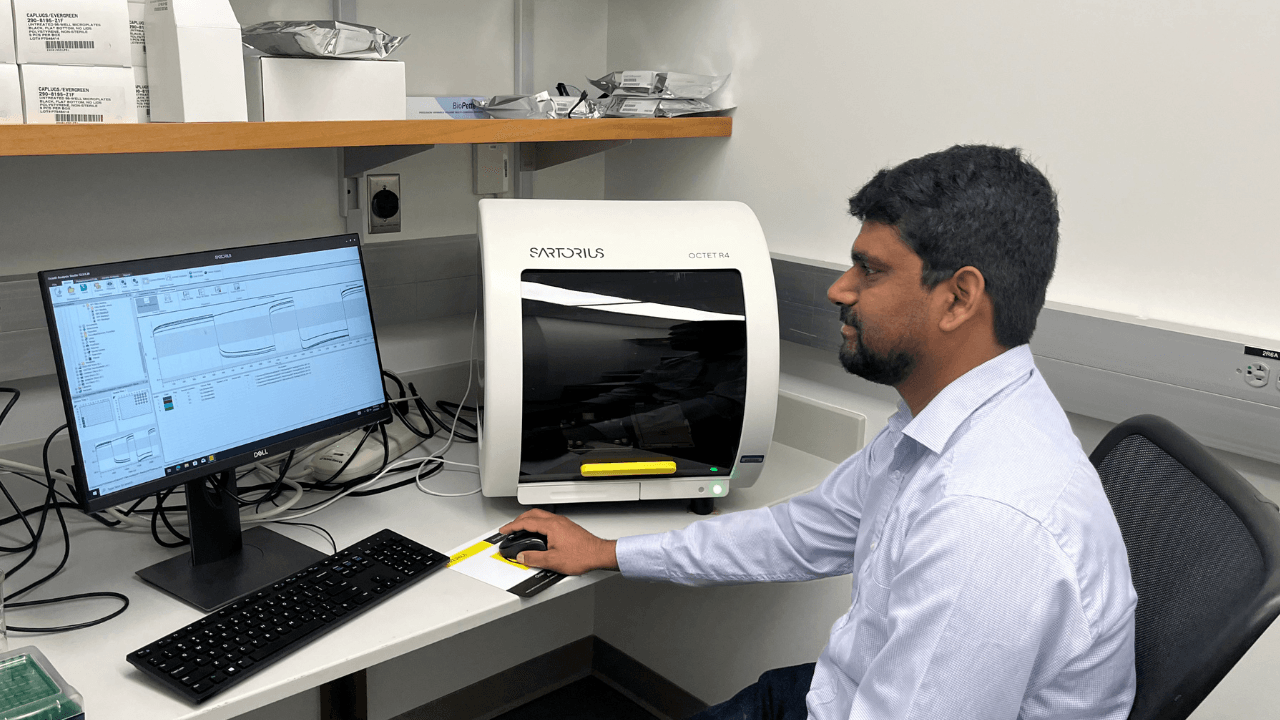News

01 February 2022
Using science to keep Stowers safe — and keep science going
Read Article
The Custom Protein Resources team produces a variety of protein-based products that support research at the Institute.

Custom Protein Resources (CPR) is a collaborative research support service that enables researchers to isolate and develop protein-based reagents to propel their research. The CPR Team strives to produce high-quality reagents and collaborate closely with each researcher to validate those reagents in their specific experimental system. The CPR Team can design, express, and isolate a wide variety of proteins from prokaryotic and eukaryotic expression systems and screen for novel reagents such as nanobodies. The team provides protein assay design expertise and access to protein analysis instrumentation.
Team Contact
Head, Custom Protein Resources
Stowers Institute for Medical Research
Bret Redwine earned a B.S. in biochemistry from the University of Missouri-Columbia in 2001. After volunteering for two years with the Peace Corps, he spent another two years as a research technician in the lab of former Stowers Investigators Joan and Ron Conaway. He received a Ph.D. in biological and biomedical sciences in 2012 from Harvard Medical School. Mentored jointly by graduate advisors Samara Reck-Peterson, Ph.D., and Andres Leschziner, Ph.D., Redwine utilized cryo-EM and single-molecule approaches to understand the structural basis for dynein motility. Following a postdoctoral fellowship under Reck-Peterson, he developed a close collaboration with the Stowers Proteomics team, now called Systems Mass Spectrometry. In 2018, he returned to the Institute as a research scientist in Cytometry and in 2021 was appointed head of newly created Technology Center, Custom Protein Resources.

Bret Redwine earned a B.S. in biochemistry from the University of Missouri-Columbia in 2001. After volunteering for two years with the Peace Corps, he spent another two years as a research technician in the lab of former Stowers Investigators Joan and Ron Conaway. He received a Ph.D. in biological and biomedical sciences in 2012 from Harvard Medical School. Mentored jointly by graduate advisors Samara Reck-Peterson, Ph.D., and Andres Leschziner, Ph.D., Redwine utilized cryo-EM and single-molecule approaches to understand the structural basis for dynein motility. Following a postdoctoral fellowship under Reck-Peterson, he developed a close collaboration with the Stowers Proteomics team, now called Systems Mass Spectrometry. In 2018, he returned to the Institute as a research scientist in Cytometry and in 2021 was appointed head of newly created Technology Center, Custom Protein Resources.
Custom Protein Resources supports Stowers Institute scientists using a multi-disciplinary, molecular level approach to protein engineering and project-customized protein-based resources and reagents. In-depth consultation with scientists results in delivery of a physical product or an intellectual solution for a given research objective.

AKTA Go
FPLC is used to isolate or characterize proteins of interest based on properties such as the presence of an epitope tag, size, ionic charge, or hydrophobic or hydrophilic nature, to name a few.

Biolayer interferometry (BLI) is a versatile technique that can interrogate the kinetics of protein-protein interactions, determine the concentration of proteins in complex mixtures, and more. BLI biosensors utilize light to capture real-time measurements of the kinetics, or rate of interactions between proteins as well as their affinity to each other.
News

06 June 2024
How new technology at the Institute is helping move science forward – from protein biochemistry to drug development
Read Article
News

16 August 2023
"I couldn’t ask for a better fit for my personality."
Read Article
Conkright-Fincham J, Tomomori-Sato C, McGhee R, Leslie EM, Beucher CJ, Weems LE, Sato S, Redwine WB, Weaver KJ, Miller BD, Delventhal KM, Kary JJ, Koebbe AB, Dean A, Witt JL, Remy LM, Parmely TJ, Zhao C, Wang Y, Conaway JW, Unruh JR. Bio-protocol. 2022;12:e4301. doi: 4310.21769/BioProtoc.24301.
